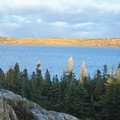 加拿大官員與Lutsel K'e Dene族13日公佈一項協定,未來雙方將讓之前長期的努力更進一步,在加拿大遠北地區設立一座全新廣大的國家公園。此座公園除了會將北美最深湖泊的一部份納入保護外,從極區森林延伸到凍原的壯麗景色,也將加以維護。
加拿大官員與Lutsel K'e Dene族13日公佈一項協定,未來雙方將讓之前長期的努力更進一步,在加拿大遠北地區設立一座全新廣大的國家公園。此座公園除了會將北美最深湖泊的一部份納入保護外,從極區森林延伸到凍原的壯麗景色,也將加以維護。
此協定的焦點在覆蓋面積3萬3525平方公里的地區,包含近4000平方公里的大奴湖。13日簽署的備忘錄開啟了Lutsel K'e Dene第一原住民部族與其他同業共同合作,發展出Dene人在國家公園各方面的運作與經營上全面參與的可行性研究,以及協商模式。
此區位於大奴湖東部,是北美靡鹿、狼群與大灰熊的棲地,在1970年就首度認定應作為國家公園保護區。超過30年的努力一部分是因為土地權的爭論問題,另一方面也是因為Dene人害怕失去他們傳統的狩獵權利。
Dene人說他們的祖先大約在7000年前來到這裡,並且熱切地看著這被稱為Thaydene Nene國家公園的保護區,意思是「祖先的土地」。
Lutsel K'e Dene的酋長強納森(Adeline Jonasson)說:「Thaydene Nene需要持續完整而嚴密的保護,不只是因為其原始且美麗的自然景觀,也是為了從古老就在這邊興盛的Akaitcho Dene族人的福址。備忘錄的簽署是未來保育我們聖神土地與文化遺產重要的一步。我們期待與加拿大國家公園一起工作的合作關係。」
保育團隊為這樣的決定歡呼,並讚揚加拿大環境部長安博(Rona Ambrose)承諾對Dene人於馬更些河(MacKenzie)流域建立的一些群落,徹底地保護。
加拿大北極行動組織(CBI)和其他團體也呼籲加拿大政府保護部落所提議的區域,並要求採礦業者停止以採礦佔據這些土地。前加拿大西北行政區總理、現任加拿大世界自然基金會及CBI特別顧問史蒂芬表示:「由於廣闊的石油與天然氣開採契約和土地佔據,西北地區的保育機會正逐漸喪失,我們需要一個更為平衡的解決途徑。」
Canadian officials on Friday announced an agreement with the Lutsel K'e Dene First Nation to advance a long-running effort to create a massive new national park in far northern Canada. The new park would protect part of North America's deepest lake and preserve a spectacular area where the landscape dramatically shifts from boreal forest to tundra.
The agreement focuses on an area covering 33,525 square kilometers, including nearly 4,000 square kilometers of Great Slave Lake.
Friday's signing of the Memorandum of Understanding (MOU) jumpstarts work with the Lutsel K'e Dene First Nation and other interests to develop a feasibility study and to negotiate the model for how the Dene will fully participate in all aspects of park operations and management.
The area on the East Arm of Great Slave Lake, home to moose, wolves and grizzly bears, was first identified for protection as a national park in 1970. The effort has taken more than three decades in part because of disputed land claims and because the Dene feared losing their traditional hunting rights.
The Dene say their ancestors first came to the region some 7,000 years ago and are keen to see the protected area named "Thaydene Nene National Park," which means "land of the ancestors."
"The protection of Thaydene Nene is critical to the continued integrity of not only this pristine and beautiful natural landscape, but also to the well-being of the Akaitcho Dene people who have thrived on this land since time immemorial," said Lutsel K'e Dene Chief Adeline Jonasson. "The signing of this MOU is a significant step forward towards the conservation of our sacred places and cultural heritage. We anticipate working together with Parks Canada in our new partnership."
Conservation groups hailed the decision and praised Canada's Environment Minister Rona Ambrose for her committed to following up on protection of a number of other areas put forth by Dene communities in the MacKenzie River Valley.
CBI and others also called on the Canadian government to protect areas proposed by the tribe and urged the mining industry to stop staking claims in these areas. The Northwest Territory is "rapidly losing conservation options, in the face of extensive oil and gas leases and mineral staking," added Stephen Kakfwi, former premier of the Northwest Territory now special advisor to WWF-Canada and the CBI. "We need a more balanced approach."





